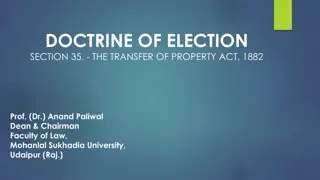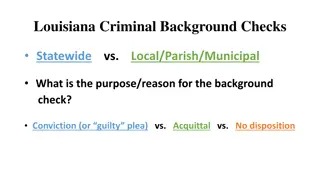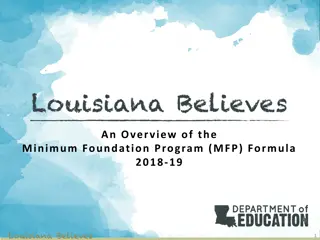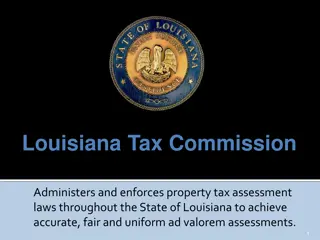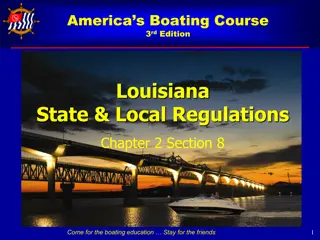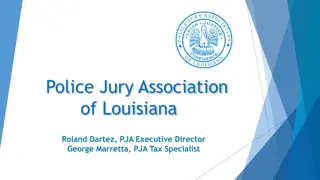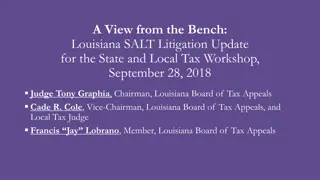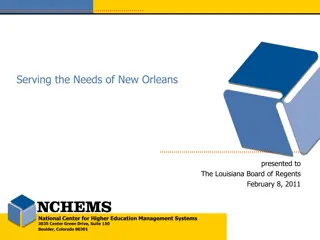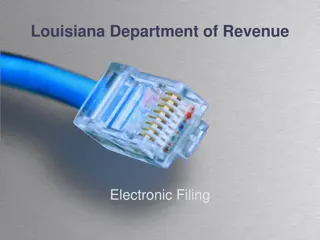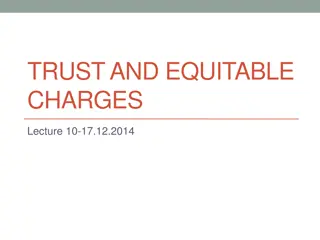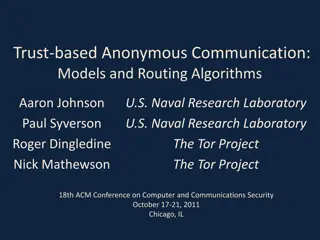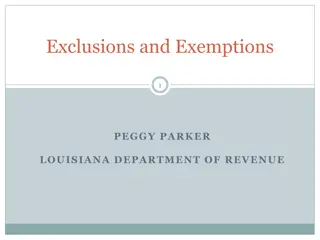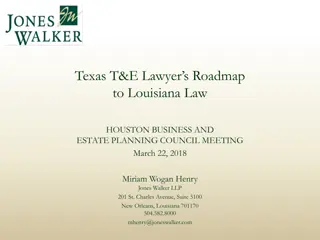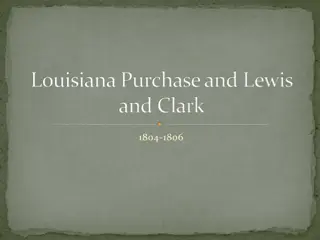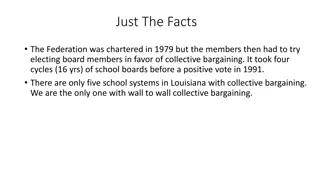Louisiana Trust Law Evolution: 1882-2018 & Beyond
Louisiana Trust Law has a rich history from the early resistance pre-1882 to its evolution over the years. Ronald J. Scalise Jr., a prominent figure in Civil Law, explores the challenges faced and the progression of trust recognition in Louisiana. Discover the pivotal moments in the development of trust law in this comprehensive study.
Download Presentation

Please find below an Image/Link to download the presentation.
The content on the website is provided AS IS for your information and personal use only. It may not be sold, licensed, or shared on other websites without obtaining consent from the author. Download presentation by click this link. If you encounter any issues during the download, it is possible that the publisher has removed the file from their server.
E N D
Presentation Transcript
The History of Louisiana Trust Law from 1882 to 2018 and Beyond Ronald J. Scalise Jr. A.D. Freeman Professor of Civil Law Tulane Law School
Early Days of Louisiana Law and the Resistance to the Trust: Pre 1882 Two Chief Hurdles to Recognition of the Trust The Civil Law s resistance to bifurcated ownership Common Law Division of Law (Enfeoff) and Equity (Uses) Civil Law Ownership is unitary and conveys full dominion Louisiana s prohibition on substitutions and fidei commissa All substitutions were prohibited Unclear what was meant by fidei commissa Succession of McCan (1895)
Early Days of Louisiana Law and the Resistance to the Trust: Pre 1882 La. Civ. Code art. 1549 (1870) Donations made for the benefit of a hospital, of the poor of a community, or of establishments of public utility, shall be accepted by the administrators of such communities or establishments.
State v. McDonoghs Executors, 8 La. Ann. 171 (1853) John McDonogh
Milnes Heirs v. Milnes Executors, 17 La. 46 (1841) Alexander Milne Monument in St. Louis Cemetery II
1882 1920 La. Act 124 of 1882 it shall be lawful for anyone to make a donation inter vivos or mortis causa of any description of property and to any amount to trustees, for educational, charitable or literary institutions, whether already existing at the time of the donation, or thereafter to be founded.
1882 1920 Paul Tulane
1882 1920 Tulane University
1882 1920 Section 8 of La. Act 124 of 1882 the provisions contained in the Revised Civil Code, or other laws of the this State, relative to substitutions, fidei commissa or trust depositions, shall not be deemed to apply to or in any manner affect donations made for the purposes and in the manner provided by this act .
1882 1920 Succession of Kernan, 52 La. Ann. 48 (1899) Facts: Donation to Archbishop of New Orleans to set up an asylum or home for the poor of both sexes similar, so far as possible, to that of St. Michael s, in the city of Rome, Italy. Rationale: In our view, there is no escape from the conclusion that, because of the destination of the property and its revenues forever to the maintenance of the charitable institution, we have the trust estate, and the title only for the purposes of that trust, vested in the legatees. Holding: Unenforceable disposition
1882 1920 Succession of McCloskey (1900) Donation in trust to pay and apply any surplus for such charitable purposes as they in their discretion shall think fit. La. Civ. Code art. 1573 (1870) Prohibits the willing by testament, by the intervention of a commissary or attorney in fact. See also La. Civ. Code art. 1571 (2018). La. Act 72 of 1918 It shall be lawful for anyone to make a donation to a trustee for educational, charitable or literary purposes generally, without designating the particular purpose to be fostered or aided, and in such cases to permit the trustee to appoint, create, or change, from time to time and as often as they may deem wise, the beneficiary of such trust estate or any part thereof.
1920 1938 La. Act 107 of 1920: First Authorization of Private Trusts 3 pages long The concepts of settlor, trustee, and beneficiary are not well defined Duration of trusts . . . shall not exceed ten years after the death of the donor . . . Powers and duties of trustees: They shall administer the property entrusted to them in conformity with the directions contained in the act of donations. La. Act 107 of 1920 repealed in 1935
1938 1964 Trusts Estates Act of 1938: A More Ambitious Enactment of Trust Law Almost 100 sections and 29 pages long Drafted due to a widespread feeling among Louisiana attorneys and bankers that a new Trust Act should be enacted to replace the Trust Act of 1920. Drafted by the Committee on Legislation of the Trust Section of the Louisiana Bankers Association. Sources: Restatement (First) of Trusts, the Uniform Trust Act; Uniform Principal and Income Act; Uniform Trustee s Accounting Act; Model Spendthrift Statute. Made Louisiana the very first state in the United States to have comprehensive trust legislation.
1938 1964 Highlights of Trusts Estates Act of 1938 Form Testamentary trust to be in a will Inter vivos one could be done either by authentic act or a signed and dated writing in the presence of two witnesses Beneficiaries Requires the beneficiary be in being and ascertainable. Indestructibility [U]nless otherwise provided in the terms of the trust the trust shall not be terminated although the settlor and the trustee and the beneficiary so desire and consent thereto. See La. R.S. 9:2028 (2018). Spendthrift Protection The trust instrument may provide by specific words that the interest of any beneficiary in the income of the trust shall not be subject to voluntary or involuntary alienation. See La. R.S. 9:2001 (2018)
1938 1964 Lowlights of Trusts Estates Act of 1938 Trustee Only allowed to invest trust property in authorized legallist of investments Duration Trust could only last until the death of the beneficiary who is a natural person or ten years from the death of the settlor, whichever was longer Forced Heirship Despite statutory authorization, it was unclear if a forced heir s legitime could be placed in trust. Succession of Earhart, 57 So.2d 695 (La. 1952). Beneficiaries Had to exist (i.e., in being and ascertainable), so no class trusts yet! Nature of Rights Trustee had title; beneficiaries rights were unclear. See La. R.S. 9:1731 & 1801 (2018)!
1964 2018 Louisiana Trust Code of 1964 Beneficiaries Separate beneficiaries of income and principal allowed, successive income beneficiares allowed Invasion of Principal Allowed, provided forced heirs were protected Trustee Legal list of safe investments abandoned in favor of prudentman standard Class Trusts Allowed, but only for children or grandchildren, or both, or that one member of the class benefitted must be living at the time of the creation of the class Modernization Sources were now the Restatement (Second) of Trusts and the Revised Uniform Principal and Income Act of 1962
1964 2018 Developments Since the 1964 Enactments: Class Trusts 1964 Trust Code Only children and grandchildren Amendments in the 1980s and 1990s Various amendments expanded to include great grandchildren, as well as nieces, nephews, grand nieces and nephews, and great grand nieces and nephews 2015 Amendment Expanded to allow above relatives of either settlor or the settlor s current, former, or predeceased spouse
1964 2018 Developments Since the 1964 Enactments: Shifting Principal Beneficiaries or Substitutions of Principal 1964 Trust Code For substitute income beneficiaries, but not principal beneficiaries 1974 Amendment Shifting principal beneficiaries allowed, but only if the principal beneficiary died intestate and without descendants 1997 Amendment Shifting expanded for non-forced heirs as long as beneficiary died without descendants 2016 Amendment Shifting expanded for non-forced heir beneficiaries who die with descendants as long as the shift is in favor of one or more of the beneficiary s descendants
1964 2018 Developments Since the 1964 Enactments: Prudent Investment 1964 Trust Code Prudentman standard 2001 Amendment Switch to prudentinvestor standard 2001 and 2015 Amendments Creating and expanding the power to adjust
1964 2018 Developments Since the 1964 Enactments: Divided Trusteeship 1964 Trust Code Multiple trustees must all exercise all powers together or, at least, by majority, and prevent a co-trustee from coming a breach of trust and . . . compel him to redress a breach of trust 2015 Amendment Different powers may now be conferred on different trustees, in which case each trustee acts independently with respect to the powers conferred upon him and shall have no duties or liabilities as to the actions or inactions of other trustees
1964 2018 Developments Since the 1964 Enactments: Delegation of the Modify 1964 Trust Code Settlor could reserve to himself the right to revoke or modify the trust and could delegate to another the right to modify only administrative provisions, but not others 2001 and 2015 Amendments Settlor can delegate the right to add, remove, or modify the rights of beneficiaries, provided the beneficiaries are all descendants of the person given the right to add, remove, or modify
1964 2018 Development Since the 1964 Enactments: Trust Modification of Termination 1964 Trust Code Trust modification or termination could be accomplished by court upon showing that continuance of the trust unchanged would defeat or substantially impair the purposes of the trust 2001 and 2015 Amendments Trust termination allowed or uneconomical trusts, defined as corpus less than $100,000 As of 2015, this can be accomplished by trustee with consent of beneficiaries without need of court involvement
1964 2018 Development Since the 1964 Enactments: Many Others Uniform Custodial Trust Act adopted in 1995 Charitable Trust Provisions Revised in 2008 Uniform Prudent Management of Institutional Funds Act (UPMIFA) adopted in 2010 Pet Trust Statute Adopted in 2015
1964 2018 Development Since the 1964 Enactments: Some Things Considered But Not Adopted Self-Settled Domestic Asset Protection Trusts Debate Regarding Public Policy Uncertainly Regarding Stability and Enforceability if Challenged Directed Trusts or Trust Protectors Uncertainty Regarding Fiduciary Role of Protector or Director Uncertainty Regarding Trustee s Role in Face of Instruction from Director or Protector Silent Trusts Uncertainty Regarding Duties to Beneficiaries Uncertainly Regarding Forced Heirship
The Future of the Trust in Louisiana: 2018 . . . Future Projects Trust Code Committee has approved a rewrite of the allocation provisions of the Trust Code regarding principal and income Unanimous agreement to simplify the class trust rules Desire to reconsider trust indestructibility in light of experience of other states and modifications to Louisiana law
The History of Louisiana Trust Law from 1882 to 2018 and Beyond Ronald J. Scalise Jr. A.D. Freeman Professor of Civil Law Tulane Law School



